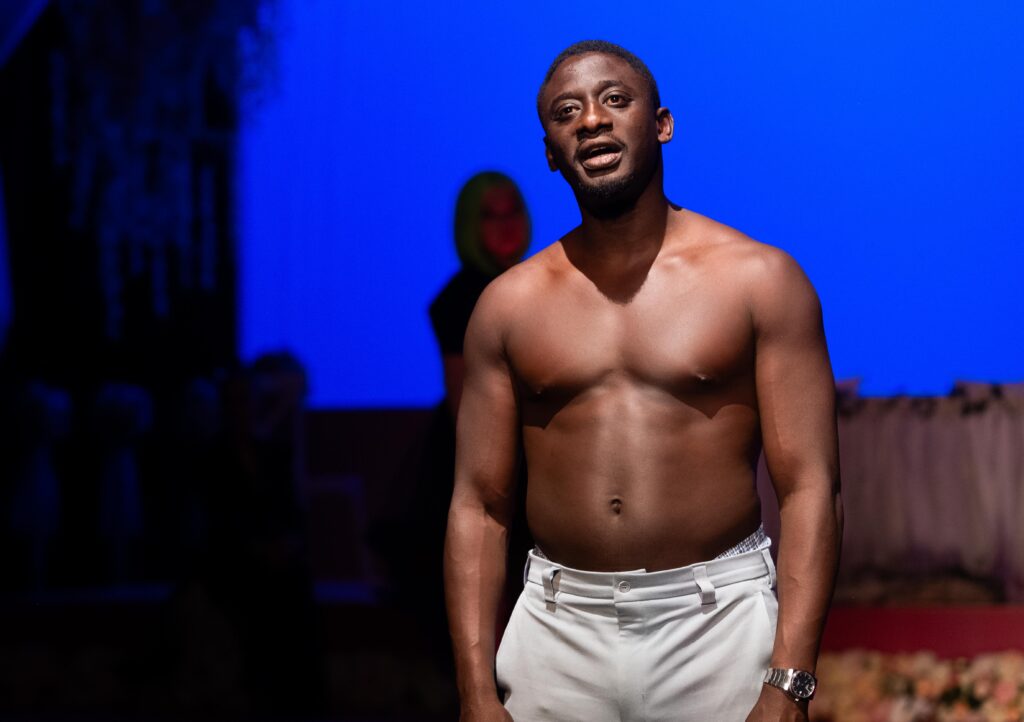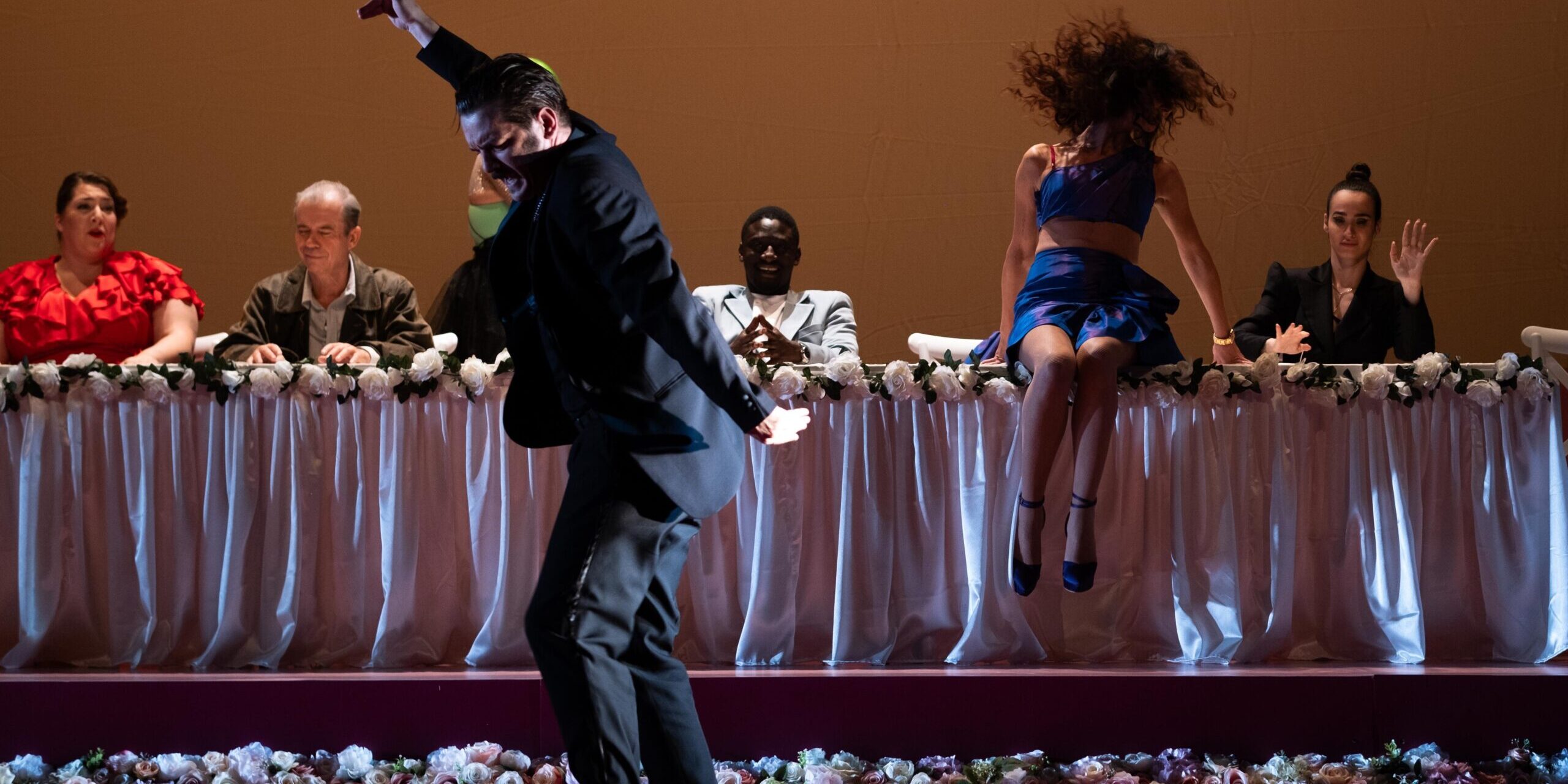National Theatre of Kosovo, Prishtina, Kosovo premiere April 25 2024
A group of theatre makers have gathered as a jury to discuss who will win the title of Best European Show. The winner will be required to represent Europe in the most politically correct way. The participating countries in this competition are Ukraine, Poland, Sweden, Malta, France, Germany, Italy, and Turkey. Everybody is waiting for the big announcement.
The play is an international co-production, directed by the renowned Bosnian director Haris Pašović and co-written with Marko Bratuš, made up of theatres from five countries: Teatru Malta, JK Opole Theatre in Poland, SNG Nova Gorica, Italy’s Teatro Due and the National Theatre of Kosovo. Just as in the jury, the cast is international, including actors from each of the five countries.
This diverse jury – made of 8 people, 4 women, and 4 men – evaluates the theatre shows which are presented to us like movie trailers via photos and short videos, which are shown on a big screen.
This jury does not consist only of artists and theatre professionals; the EU President’s preferences about the shows is also taken into consideration. The voting is not free. The decision is political. In this way the, the show has obvious parallels with the Eurovision Song Contest and the voting is organized in a similarly “democratic” way, where each audience member has to vote.
Some of the jury members (like Grotowsky played with skill by Felix Römer) are competent enough to judge the show and ask the important questions. Others like the character play by Kosovar actor Armend Smajli just throw tantrums, indulge in personal rivalry and disagree about any topic under discussion.
There is a strong sense of the jury having to vote necessarily and under a time limit, with the public waiting to find out who is the winner.
Designer Krystian Szymczak decorates the theatre as if for a wedding (the jury comments on how the room was used for a wedding previously on the same day), with a long lower-bedecked banqueting table and a screen which flashes vibrant colours, Eurovision-style.
The themes of the various European shows with which we are presented cover a wide range of topics, and upon touch war, racism, religion, mafia, money, power, climate change, and the drug trade.
The issue of sexual harassment in theatre is also mentioned, as is the threat of digitization. The way the focus shifts from one area of discussion to another makes it feel like they tried to include as many issues as possible that concern Europe and European theatre. Some of the issues are depicted as manufactured to camouflage the real issues of the day – climate change is spoken of in this way. The jury says the countries face more serious problems than that.
The Maltese section talks about the assassination of the Maltese journalist and blogger Daphne Caruana Galizia, the courageous investigative journalist who uncovered networks of corruption in her country and was murdered with a car bomb in 2017.
However, because the the themes of the shows are so many, nothing is discussed in a thorough way, the dialogue flies from one topic to the next without allowing enough time for the information to sink in or even flow smoothly.

The Best European Show. Photos: Edgar de Poy
At one point the jury says how the EU countries are failing to help Ukraine. In another scene they mention Loreen, the Swedish winner of the Eurovision Song Contest. They ask how was it possible for Sweden’s music go from Abba to Loreen, as if to say to politicize art and music is to degrade the purity of it. This is a contest in which you win with entertaining songs that hold no real artistic value in themselves. The fact that Kosovo is not yet part of Eurovision Song Contest, nor the EU for that matter, wasn’t addressed in the play. It would have been interesting to have included something from this viewpoint.
Because of the structure of the show, while few of the topics feel well developed and many, it does ask some important questions in the process (such as can an artist be a tool of tyranny? Why are politicians a part of the judging process?) but due to the somewhat unfocused pacing of the play, they don’t have as much of an impact as they might.
Throughout, there’s the ongoing presence of Radical Audience Warriors, rebels who are said to be protesting outside the theatre against the show, and two of them do radical actions later in the show. The most effective scene on an emotional level is the moment when it is revealed that none of the jury members know the name of the employee who used to bring them food for three months (he turned to be a member of Radical Audience Warriors), after he passed away in the workplace.
There are references to Shakespeare including a monologue on how the character of Othello is viewed chiefly through the lens of race. The play also discusses the difficult conditions facing cultural institutions, including crumbling buildings and leaking roofs.
The cast are truly invested in this play, which takes more than two hours to cover all this ground. The Best European Show has plenty of ambition and contains a mixture of interesting ideas, but it tries to cover too much, and it is impossible to clearly navigate all of them.
Tonally it shifts between satire and tragedy, but never effectively transmits the intended emotions. There’s blood on the stage but these tragic scenes do not feel an organic part of the play. New scenes keep coming. Every time I thought that this would be the last scene, another new one popped up. In one of these not-quite-last scenes two of the theatre professionals have some moment of enlightenment, but the scene is not credible enough due to the way these characters have been built up previously. Up until this moment, their development as characters has gone in another direction, so it’s hard to believe they are the people who they claim to be by the end, and it’s unsatisfying as a result. Had the show ended earlier, it might have better expressed what it was trying to convey.
Credits
Director: Haris Pasović// Text: Marko Bratus & Haris Pasović //Composer: Trimor Dhomi //Choreographer: Robert Nuha//Lighting designer: Claudio Coloretti
Set Designer and Costume Designer: Krystian Szymczak//Video: Dino Hujić
Further reading: The Best European Show: “A reality check of where we are today”
Further reading: Interview with Haris Pašović: “Everyone excluded should be included”
Florida is a lover of words, and of art in all its forms: fiction, poetry and drama.








